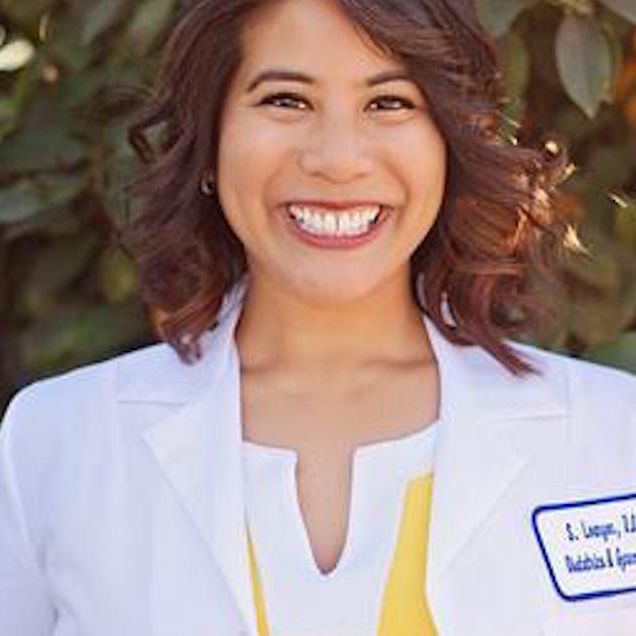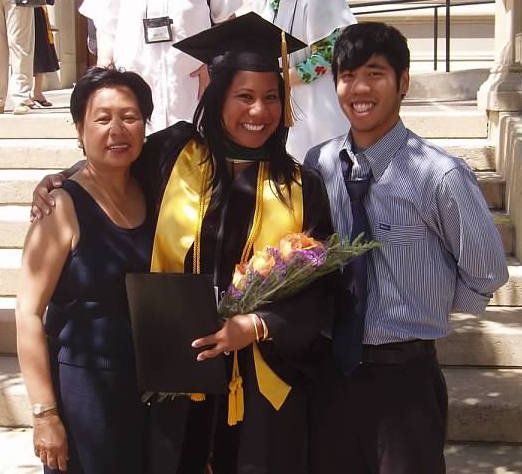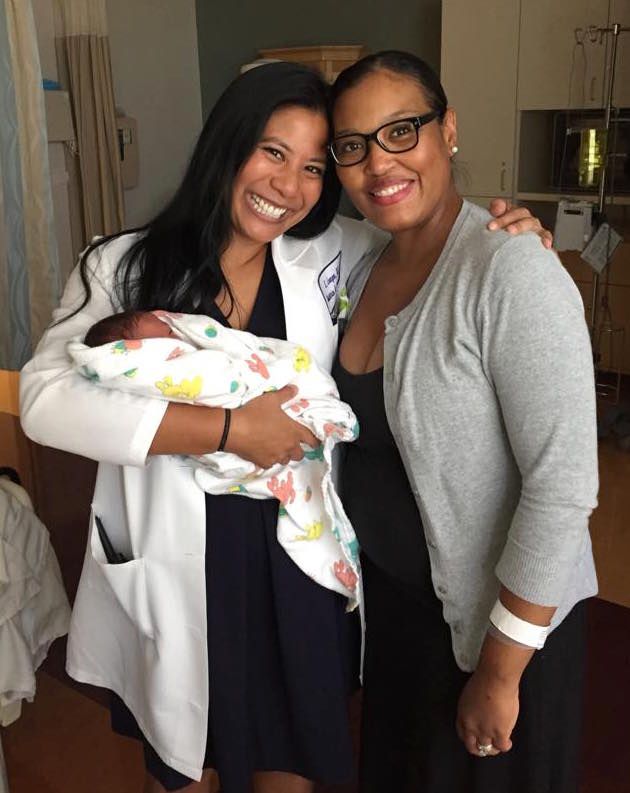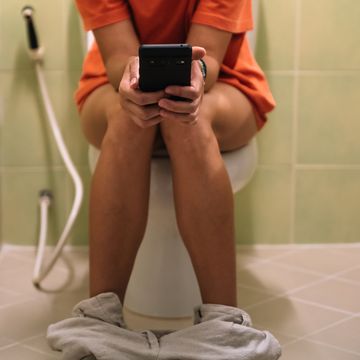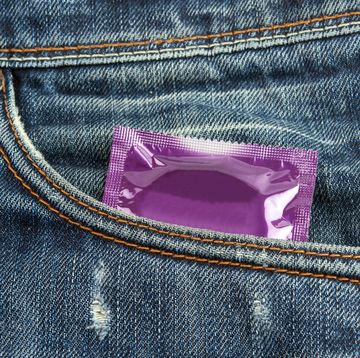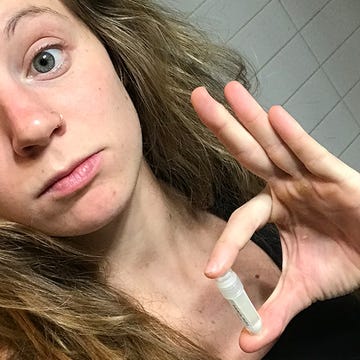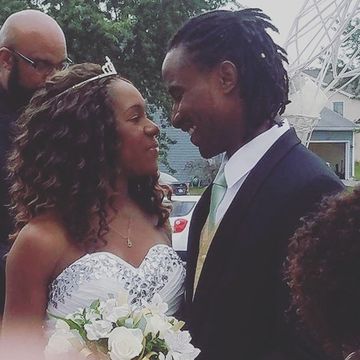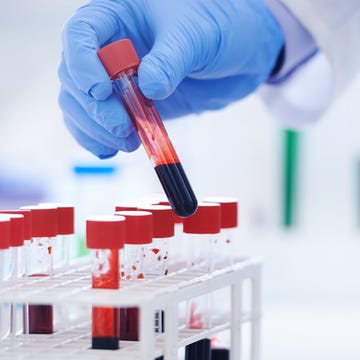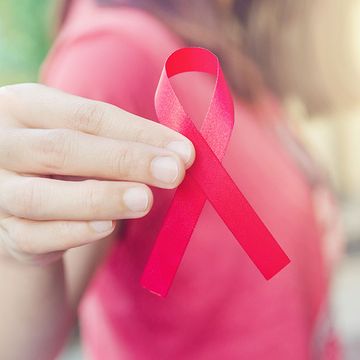I was 20 years old, sitting on the exam table in the medical clinic of my college campus, when the nurse practitioner uttered four dreaded words: "It looks like herpes." She scribbled an Rx, and with a swift tear of the prescription pad, promptly left the room. I was stunned.
How could I have a virus that sounded so dirty when I was still a virgin? I was in a relationship with my first serious boyfriend, and we hadn’t even had vaginal intercourse yet.
But neither of us realized that I could catch genital herpes from oral sex. He had a history of cold sores, though none were visible when we'd been intimate.
At the time, my diagnosis felt very vague to me (I didn't have nearly as many internet resources to turn to back then), but I was keenly aware that there was a stigma surrounding herpes. I was devastated. I felt like I had everything going for me up until that point. As a bubbly, outgoing, first-generation Filipina (and pre-med biochemistry major at Vassar College with excellent grades), I dreamed of becoming a doctor. I didn’t want to believe I had an incurable diagnosis, so instead I swept the subject under the rug and pretended it never happened.
My boyfriend and I ended up staying together for another year and half after my diagnosis, but things eventually fizzled out and we broke up. After that, it was really hard to emotionally connect with another guy. I was scared that if I admitted I had herpes to a potential partner, he would deem me imperfect and tainted, leave me, and confirm what I already feared about myself: I was unworthy of love, was meant to suffer, and didn't deserve a true partner in life. I felt embarrassed, ashamed, and alone.
Eventually, I realized my dream of attending medical school, though I never disclosed my virus to my fellow students. While I would readily discuss herpes and other viruses over coffee with my study group at Starbucks, I’d simply ignore the fact that we were reviewing and perfecting our knowledge of a taboo sexually transmitted disease that I housed in my own body.
RELATED: 7 Things You Should Never Say to Someone with Herpes
Initially, I wanted to specialize in family practice, but once I did a rotation in the ob-gyn department, I knew that that was my calling. Ob-gyn practitioners need boundless energy, and the variety of surgery, office, and labor and delivery suited my personality well. Plus, I could identify with the young teens who cried when I diagnosed them with herpes and who wondered if anyone could love them.
"I didn’t want to believe I had an incurable diagnosis, so instead I swept the subject under the rug and pretended it never happened."
For a long time, I scooted along in the world as Dr. Loanzon, the confident, esteemed surgeon in the office and hospital during the day. But during my off hours, especially when I was in my twenties and thirties, I was Sheila, the timid, insecure, and shy girl hiding the fact that she had herpes. There was a huge disconnect between my persona as a physician and as a patient.
As a physician, I was informing and educating patients on how to treat outbreaks, engage in safe sex, and live successfully with the virus. But as a patient, I believed there could only be punishment, suffering, and judgment for me. I concealed my virus from my partners and friends for over 15 years until I made a personal commitment to marry these two parts of myself.
Before I made the desicion to be open about having herpes, my desire to be loved was so strong that lying became my survival mode. I took precautions and used condoms, regularly took daily suppression medication, and avoided being sexually active during my infrequent outbreaks. Still, I felt guilt for betraying my partners' trust. I was confused about how to start these difficult confession conversations, and was embarrassed to admit that I was a medical professional with herpes.
Looking back, I should have informed all of my partners that I had the virus before we had sex. This would have allowed them to make their own informed decisions. Everyone makes mistakes, and if I could, I would have handled the situation differently. I did inform my partners before my new book, Yes, I Have Herpes, came out, and understandably, a few were surprised. But the majority of the reactions were positive, and they wished me the best. Luckily, I didn't transmit the virus to any of them.
RELATED: I Tested Positive for Herpes—Now What?
For a year and a half, I used an online dating site and found multiple suitors who didn't mind that I was herpes positive. It was freeing to realize that I did have choices. By being open, I was attracting men who were much more genuine, mature, and compatible than the ones I met when I was keeping my diagnosis a secret. Now, I disclose my herpes status to potential partners when I feel that we are heading in the direction of intimacy. I've been with my current partner for a year and am really happy.
Although I only tell a select few patients that I have herpes, my intimate knowledge of the virus helps me understand the emotional turmoil my patients experience when I diagnose them with it. I've dealt firsthand with the same worries: How does this affect my partner? What will my outbreaks look like? How long will this treatment take to work? Can I still get pregnant? I do my best to avoid confusing medical terms and instead offer the straightforward facts and comforting hug that I craved the most when I received my own diagnosis in college. I encourage patients to realize this is a common, albeit stigmatized, virus, and I let them know that there are people out there who won't judge them for having it.
I love being the person who can inform them from a professional perspective—but with the compassion that comes from being a patient myself. And, as someone who struggled with dating with herpes, I'm able to offer advice and support for communicating with partners and encouraging a healthy sexual life. I discuss how important it is to disclose the diagnosis before having sex, and we review safe sex practices. I also tell them that I am available if they have any questions, concerns, or come across confusing medical information on the internet. My colleagues at the practice where I work have been especially supportive. They have come into my office to let me know that stepping forward with my diagnosis is a bold and admirable move.
"I can easily detect what worries my patients most because I have dealt firsthand with the same ones."
RELATED: There’s a Very Good Chance You Have Herpes
That’s why I decided to write a book about my experiences. By sharing what I've gone through, I hope to help others find confidence, self-worth, and acceptance—even with a herpes diagnosis. While there is a plethora of info about the STD out there, it’s often very clinical and lacking a personal perspective. By exposing my own medical issues, I want to empower women with the knowledge that they can have fulfilling sex lives, regardless of their STD status. It’s taken a long time, but after being both a patient and a physician, I now know that there's no reason to be ashamed of herpes. And if I can help women feel less alone, then I know that this has all been worth it.
Sheila Loanzon, M.D., is a board-certified obstetrician and gynecologist with more than 15 years of patient and personal experience with the diagnosis of herpes. She currently works at a large multi-speciality practice in California and is the author of Yes, I Have Herpes.
